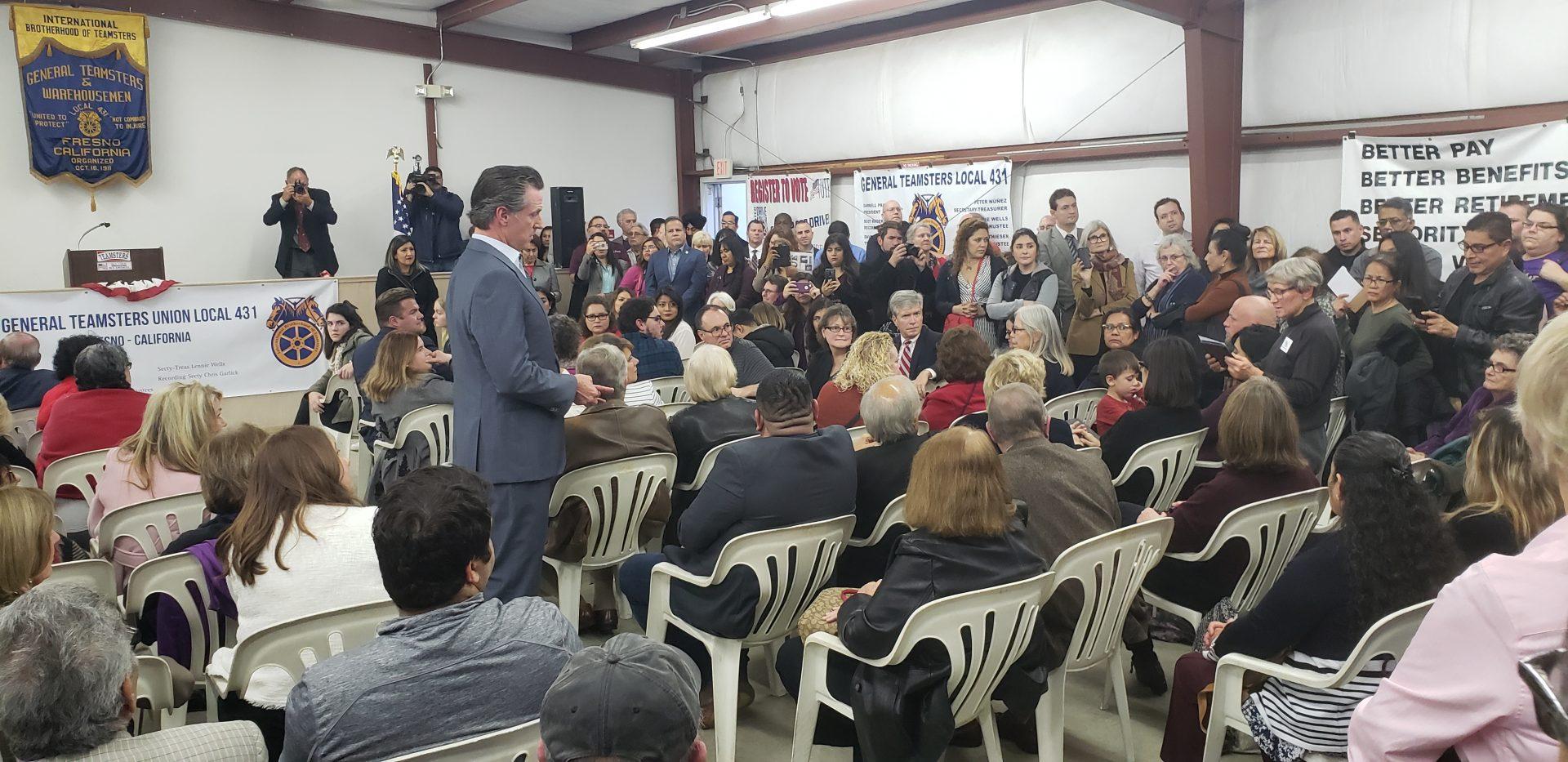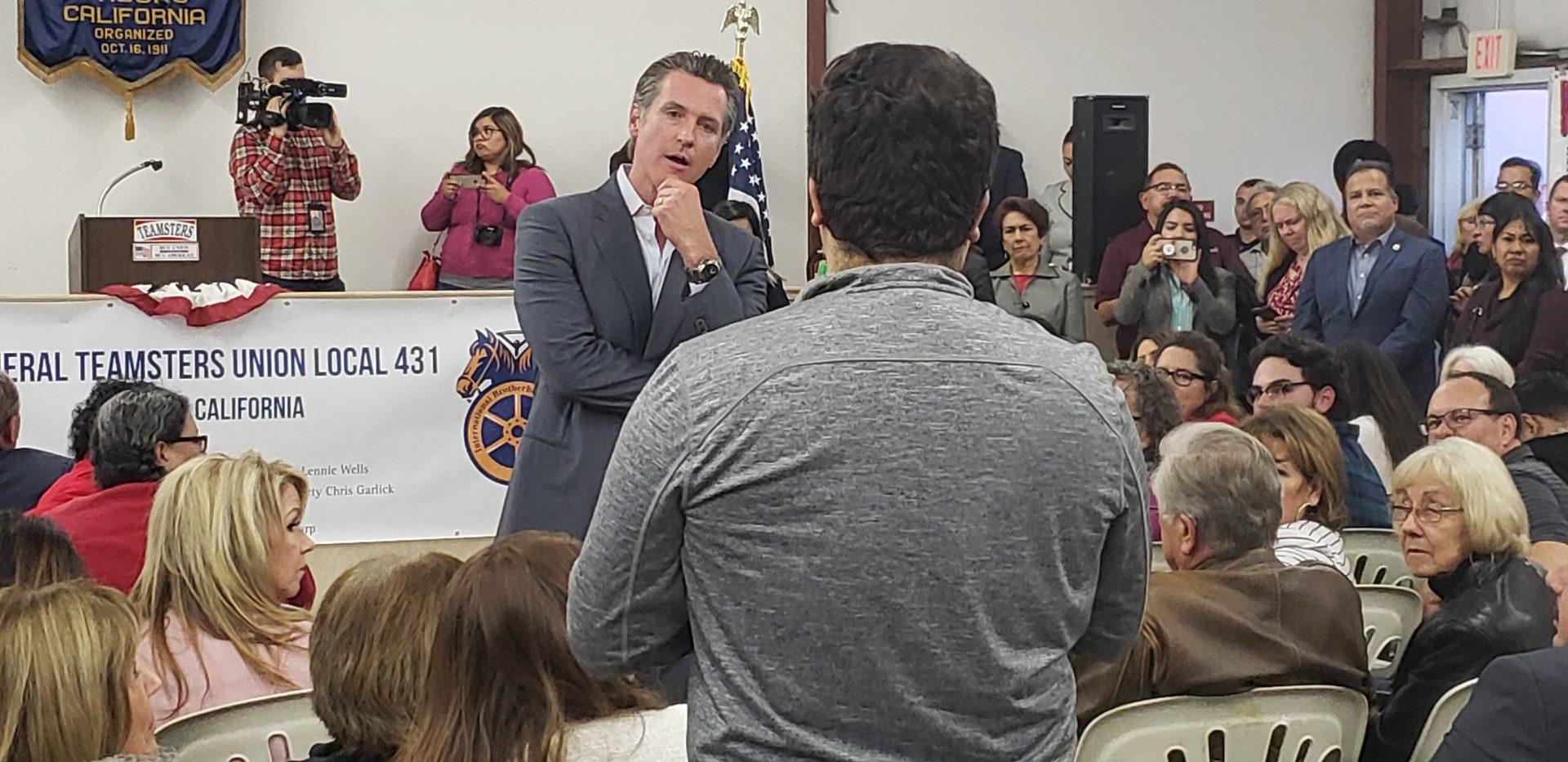California Gov.-elect Gavin Newsom was greeted by San Joaquin community and business leaders during his visit to Fresno on Friday.
At the Teamsters Joint 431 Hall in West Fresno, Newsom discussed what he referred to as the “Californian Dream” and, more specifically, the “Central Valley Dream.”
“This is my third time here, and a lot of you weren’t here the last time. This is packed,” Newsom said, referring to the crowded hall. “I want to demonstrate, not just rhetorically, but substantively, my commitment — not passing interest — my commitment to this community, to this state, because you are a big part of this state. You’re one of the most dynamic parts of this state. You’re one of the fastest-growing parts of this state.”
The governor-elect fielded questions from an audience of about 300 on topics including water issues, homelessness, immigration, prison reform and the construction of the high-speed rail, during the forum that lasted just over an hour.

Newsom said his commitment to the Central Valley was to “paint a bolder and brighter picture” of the region, so the rest of the state could gain a greater understanding and appreciation of the efforts and issues unique to the region.
Newsom addressed the subject of higher education at several points during the forum. He pledged to promote and expand higher learning institutions, not only in the CSU and UC systems, but also at regional levels in community colleges to help individuals advance their opportunities for employment in a rapidly changing economic landscape.
A topic that arose several times during the meeting was the concern for water safety and availability in the Valley. One attendee of the event from the town of Parlier suggested Newsom call a summit of political leaders from the smaller communities in the San Joaquin Valley to address the issue of contaminants in the drinking water.
Coalinga Mayor Nathan Vosburg noted the economic devastation that had plagued his city as a result of California’s recent drought, asking Newsom what his plans were to aid drought-affected communities in the Central Valley.
“The idea that we have multiple Flint, Michigans, in our state, that’s…unbecoming of who we are and what we stand for,” Newsom said. “We own this, we’ve got to fix this.”
Immigration was another subject that Newsom spoke about at length, expressing his disdain for the treatment of individuals being detained and deported by immigration enforcement agencies.
He also acknowledged California’s status as a border state and as one of the most diverse states, as well as California’s population containing more undocumented individuals than any other state, as reasons that California has the most to gain or lose when addressing immigration policy on both a state and national level.
Newsom noted that other politicians such as former Texas Gov. Rick Perry and former Arizona Gov. Jan Brewer have been very vocal and influential in the past in expressing their agendas on immigration reform from a state level, and shaping the national conversation.
He said that California’s values in regards to immigration policy have been largely unseen and unheard in the national arena. Newsom said it is his responsibility to take the lead in asserting California’s immigration policy stance to the forefront of national politics.
In acknowledging questions about the financial viability and current status of the construction of California’s high-speed rail, Newsom stated that he understood that the cost of the project had risen greatly since his advocacy of the rail’s proposal. He said that the low-end cost estimate of the high-speed rail is now $77.3 billion and the high-end estimate is close to $100 billion, far from the $33 billion original estimate.
“It’s no longer the same proposal that I was advocating for, and I’m not naive about any of this,” Newsom said. “I’ve been very critical of the last few financing plans because I think they, frankly, have not been as truthful and transparent as they could have been and should have been.”
Newsom said he intends to take responsibility and to be as forthright and open about the high-speed rail’s cost and completion projection moving forward. He said he is in the process of assessing the stewardship of the High-Speed Rail Authority and is reviewing a recent audit of the project to do justice to Valley residents’ enthusiasm and anxiety in regards to the rail’s construction.
As the evening’s session approached its end, Newsom began answering questions more succinctly, working to address as many of the concerns of the attendees as he could in the allotted time.
He concluded the meeting by stating that, perhaps, further discussions addressing California’s most pressing issues should be conducted in the San Joaquin Valley.
“Forget UC Berkeley, we’ll figure it out at UC Merced and Fresno State,” Newsom said.




